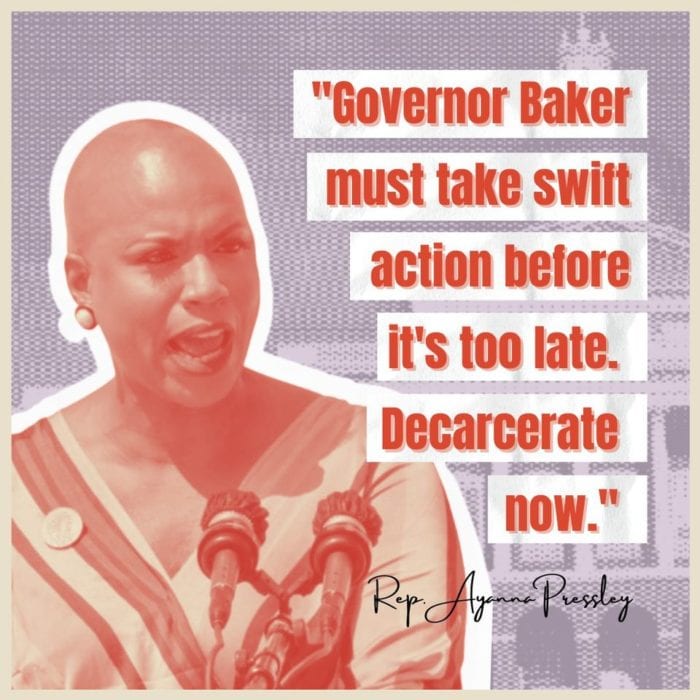
Unsanitary conditions put incarcerated at risk.
Congresswoman Ayanna Pressley and Suffolk County District Attorney Rachael Rollins sent a letter to Gov. Charlie Baker on Nov. 10, calling upon him to release incarcerated prisoners who are at risk of contacting the coronavirus. According to a press release, this population includes “older individuals, individuals with preexisting medical conditions, juveniles, pregnant individuals, and those with less than a year remaining on their sentence. Pressley also held a press conference on Tuesday at the State House, discussing the urgency of sending these prisoners back to their families before the spread worsens.
“We cannot pick and choose who among us is deserving of being saved, but instead, we must prioritize the safety and wellbeing of as many people as possible,” Pressley and Rollins wrote in the letter. “A recent study by the American Civil Liberties Union has found that the failure to aggressively decarcerate and reduce the incarcerated population could add 100,000 fatalities to our nation’s overall death count – among people both in and outside of jail. It is clear, you have a moral and legal obligation to care for the wellbeing of those who are incarcerated while they are in state custody.”
An article by WGBH noted that the Department of Corrections found 172 prisoners at Massachusetts Correctional Institution in Norfolk tested positive for the virus, an increase from the 140 people found the day before. Many jails in Massachusetts have seen spikes in infected people. The institutions frequently have unhygienic conditions, with inmates sharing a few bathrooms and living in tiny spaces. The letter called jails “petri dishes” for the spread of the pandemic, stating that while CDC guidelines call for physical “distancing, sanitary practices, and access to medical professionals,” the detention facilities are “largely overcrowded, unsanitary and limited in healthcare.”
Pressley and Rollins pointed to cases like in New Jersey, where over 2,000 people were released from prison as a safety precaution, with intentions of releasing close to 1,000 more later on. They expressed that Baker has the power to act swiftly and make this change, calling for the release of vulnerable prisoners who do not pose a threat.
“…You can rectify the problem with the stroke of a pen,” reads the letter. “…Across the Commonwealth, you should direct prisons and jails to reduce the incarcerated population as quickly and as safely as possible. The lives of Massachusetts residents depend on your compassion and courage, because public health decarceration is literally a matter of life and death.”
Shira Laucharoen is a reporter based in Boston. She currently serves as the assistant director of the Boston Institute for Nonprofit Journalism. In the past she has written for Sampan newspaper, The Somerville Times, Scout Magazine, Boston Magazine, and WBUR.

